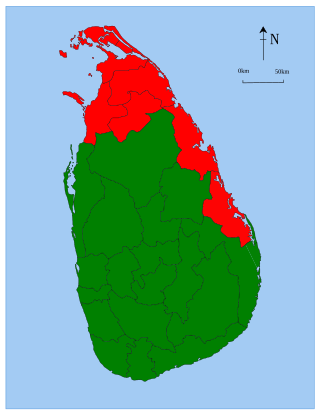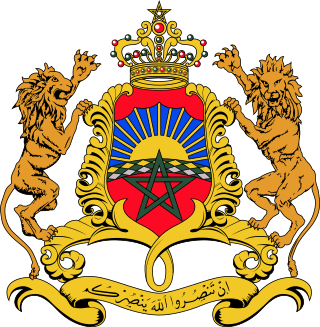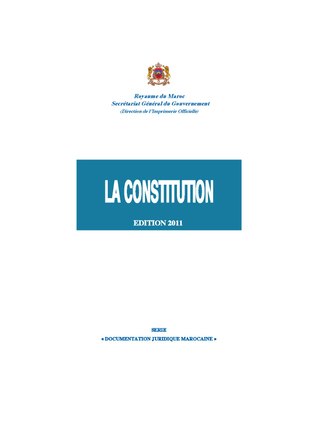A constitutional amendment is a modification of the constitution of a polity, organization or other type of entity. Amendments are often interwoven into the relevant sections of an existing constitution, directly altering the text. Conversely, they can be appended to the constitution as supplemental additions, thus changing the frame of government without altering the existing text of the document.

Romania elects on a national level a head of state – the president – and a legislature. The president is elected for a five-year term by the people. The Romanian Parliament has two chambers. The Chamber of Deputies has currently 330 members, elected for a four-year term by party-list proportional representation on closed lists. The Senate has currently 136 members, elected for a four-year term by party-list proportional representation on closed lists.

Elections in Benin take place within the framework of a multi-party democracy and a presidential system. Both the President and the National Assembly are directly elected by voters, with elections organised by the Autonomous National Electoral Commission (CENA).
In Australia, referendums are public votes held on important issues where the electorate may approve or reject a certain proposal. In contemporary usage, polls conducted on non-constitutional issues are known as plebiscites, with the term referendum being reserved solely for votes on constitutional changes, which is legally required to make a change to the Constitution of Australia.

Elections in Egypt are held for the president and a bicameral legislature. The president of Egypt is elected for a six-year term by popular vote after draft amendments to the 2013 constitution altered the presidential term limits from the original four years to six years.

Elections in Lithuania are held to select members of the parliament, the president, members of the municipal councils and mayors, as well as delegates to the European Parliament. Lithuanian citizens can also vote in mandatory or consultative referendums.

Malta elects on a national level 6 MEPs representing Malta in the European Parliament, on a district level the legislature, on a local level the local councils, and on a community level the Administrative Committees.
Referendums concerning the independence of judges and four-year parliamentary terms were put to New South Wales voters on 25 March 1995. The referendums coincided with that year's New South Wales general election. Both changes had the support of the major political parties and were approved by large majorities.

The 1982 Sri Lankan national referendum took place on December 22, 1982, giving the people of Sri Lanka the option to extend the life of parliament by 6 years. It was the first and so far only national referendum to be held in Sri Lanka. The referendum was called for by President J. R. Jayawardene, who had been elected to a fresh six-year term as President in October 1982. With the life of the current parliament due to expire in August 1983, Jayawardene faced the possibility of his ruling United National Party losing its massive supermajority in parliament if regular general elections were held. He therefore proposed a referendum to extend the life of parliament, with its constituents unchanged, thereby permitting the United National Party to maintain its two-thirds parliamentary majority.

A constitutional referendum was held in Morocco on 24 July 1970. The new constitution replaced that approved by referendum in 1962, but suspended by King Hassan II in 1965 following riots in Casablanca. It was approved by 98.8% of voters, with a 93.2% turnout. Following its approval, fresh elections were held on 21 August.

A constitutional referendum was held in Morocco on 23 May 1980. The referendum asked whether voters approved of changes to article 21 of the 1972 constitution, which concerned the Regency Council, and reduced the age of majority for the King from 18 to 16. The changes were approved by 99.6% of voters, with a 96.8% turnout. A second referendum was held a week later on articles 43 and 95.

A referendum on extending the parliamentary mandate was held in Morocco on 1 December 1989. As elections had been held in 1984, the six-year term for Parliament due to expire in 1990. The decision was approved by 100% of voters, with a 98.8% turnout.

A constitutional referendum was held in Morocco on 4 September 1992. The amended constitution increased the number of seats in the Parliament from 306 to 333, with the number of directly elected seats rising from 204 to 222. It also allowed the Prime Minister to appoint the rest of the cabinet, and for legislation to be promulgated a month after being passed by the Parliament, regardless of whether the monarch had given assent. The changes were approved by 99.96% of voters, with 100% voting in favour in major cities and three of the four provinces in the disputed territory of Western Sahara. Voter turnout was reported to be 97.29%. Fresh elections were held the following year.

A referendum on constitutional reforms was held in Morocco on 1 July 2011, called by the king in response to a series of protests across Morocco that began on 20 February 2011 when over ten thousand Moroccans participated in demonstrations demanding democratic reforms. A commission was to draft proposals by June 2011. A draft released on 17 June foresaw the following changes:

A referendum on the length of the term of Parliament was held in New Zealand on 23 September 1967. Voters were asked whether they approved of extending the term from three to four years. The change was rejected by 68.1% of voters, with a turnout of 69.7%.

A referendum on the length of the term of the New Zealand Parliament was held on 27 October 1990. Voters were asked whether they approved of extending the term of office from three years to four. The change was rejected by 69% of voters, with a turnout of 82%.

The Constitution of Morocco is the supreme law of the Kingdom of Morocco. The constitution defines Morocco as a constitutional monarchy and lays out the fundamental rights of Moroccan citizens, it also defines the basis and structures of government, the council of ministers, and the parliament.

A referendum on reducing the term length of Parliament from five to four years was held in the Cook Islands on 7 September 2004. It followed a referendum on the same subject in 1999 that was approved by a majority of voters, but not the two-thirds required to be passed. The proposal would amend article 37 of the constitution, which at the time read "The Queen's Representative shall dissolve Parliament at the expiration of 5 years from the date of the last preceding general election, if it has not sooner been dissolved." The change was approved by 82.27% of voters, passing the two-thirds threshold.
A referendum is a direct vote in which an entire electorate is asked to either accept or reject a particular proposal. This article summarises referendum laws and practice in various countries.

The Queensland fixed four-year terms referendum was a one-question referendum held in the Australian state of Queensland on 19 March 2016, in conjunction with the state's local government elections. Electors were asked if they approved of a bill to amend the Constitution of Queensland 2001 and the Constitution Act Amendment Act 1934 to legislate for fixed-term elections for the Legislative Assembly of Queensland, to be held in the last week of October every four years. The referendum was conducted by the Electoral Commission Queensland (ECQ).











